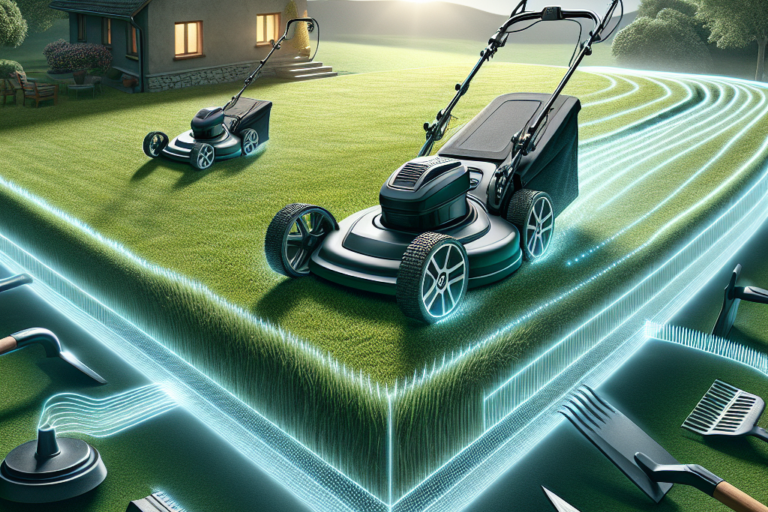In the battle of electric mowers versus gasoline mowers, the key question that arises is their impact on emissions. When it comes to keeping our lawns pristine, it’s natural to want a mower that not only gets the job done effectively but also does so without harming the environment. In this article, we will explore the differences between electric mowers and gasoline mowers in terms of their emissions, providing you with the knowledge to make an informed choice for your lawn care needs.
Electric Mowers
Electric mowers are a popular choice among environmentally conscious homeowners due to their reduced emissions. Compared to gasoline mowers, electric mowers produce significantly fewer pollutants, making them a greener option for lawn maintenance. By opting for an electric mower, you can contribute to the overall reduction of harmful emissions.
Reduced Emissions
One of the primary advantages of electric mowers is their reduced emissions. Unlike gasoline mowers, which emit toxic fumes, electric mowers operate using electricity, resulting in cleaner air and a healthier environment. The absence of exhaust emissions makes electric mowers a great choice for those who are concerned about their ecological footprint.
Zero Tailpipe Emissions
Another notable benefit of electric mowers is their zero tailpipe emissions. Since they do not rely on internal combustion engines, electric mowers eliminate the release of pollutants such as carbon monoxide, nitrogen oxides, and volatile organic compounds commonly associated with gasoline mowers. This absence of tailpipe emissions is not only beneficial to the environment but also improves the air quality in your immediate surroundings.
Lower Carbon Footprint
By choosing an electric mower, you significantly reduce your carbon footprint. The energy used to power electric mowers can be sourced from renewable sources like wind, solar, or hydroelectric power, further minimizing the environmental impact. Consequently, the use of electric mowers contributes to the overall reduction of greenhouse gas emissions and supports the transition to a cleaner and more sustainable future.
Reduced Noise Pollution
In addition to lower emissions, electric mowers also offer the advantage of reduced noise pollution. Gasoline mowers are notorious for their loud operation, which can be disruptive to both homeowners and their neighbors. On the other hand, electric mowers operate quietly, allowing you to mow your lawn without disturbing the peace and tranquility of your neighborhood. This makes electric mowers a great choice for those living in noise-sensitive areas or for those who value a peaceful and quiet outdoor environment.
Gasoline Mowers
While gasoline mowers have long been the traditional choice for lawn maintenance, they come with certain drawbacks when compared to their electric counterparts. Gasoline mowers contribute to higher emissions, pollution from combustion, an increased carbon footprint, and noise pollution. Considering these factors, electric mowers prove to be a more eco-friendly alternative.
Higher Emissions
Gasoline mowers produce higher emissions compared to electric mowers. These emissions release harmful pollutants into the air, such as carbon monoxide, nitrogen oxides, and volatile organic compounds. These pollutants are known to contribute to the greenhouse effect and pose a risk to both human health and the environment.
Pollution from Combustion
Unlike electric mowers, which rely on electricity to operate, gasoline mowers require the combustion of fossil fuels. Combustion introduces pollutants into the air that can have long-lasting negative impacts on air quality. The emissions from combustion not only contribute to climate change but also pose health risks, especially for individuals with respiratory conditions or allergies.
Carbon Footprint
Gasoline mowers contribute to a larger carbon footprint compared to electric mowers. The extraction, refining, and transportation of gasoline release greenhouse gases into the atmosphere, adding to the overall carbon emissions. By opting for an electric mower, you can significantly reduce your carbon footprint and play a part in mitigating climate change.
Noise Pollution
One of the often-overlooked drawbacks of gasoline mowers is the noise pollution they generate. The loud operation of these mowers can disturb the peace and tranquility of your neighborhood, causing annoyance to you and your neighbors. The use of electric mowers, with their quieter operation, can help maintain a peaceful environment while completing your lawn maintenance tasks.

Comparison Factors
When deciding between electric mowers and gasoline mowers, it’s important to consider various factors that compare their environmental impact. The key factors to analyze include emission levels, air quality impact, contributing factors, and overall environmental impact.
Emission Levels
Electric mowers produce minimal emissions or none at all, while gasoline mowers generate significant amounts of pollutants during operation. This stark contrast in emission levels highlights the superiority of electric mowers in terms of environmental friendliness.
Air Quality Impact
Due to their cleaner operation, electric mowers have a positive impact on air quality, reducing the presence of harmful pollutants. Conversely, gasoline mowers contribute to air pollution, particularly in densely populated areas where multiple mowers may be in use simultaneously.
Contributing Factors
Electric mowers contribute to sustainable energy practices by utilizing electricity from renewable sources. This reduces dependence on fossil fuels and supports the transition to a cleaner, greener energy future. On the other hand, gasoline mowers contribute to the demand for fossil fuels, perpetuating the carbon-intensive cycle of extraction, refinement, and consumption.
Environmental Impact
When considering the broader environmental impact, electric mowers have a clear advantage. From reducing greenhouse gas emissions to minimizing noise pollution, electric mowers offer a more sustainable solution for lawn maintenance. By choosing electric mowers, you actively contribute to addressing climate change, improving air quality, and creating healthier environments for both humans and wildlife.
Emission Levels
When comparing emission levels between electric mowers and gasoline mowers, the contrast is significant. Electric mowers produce minimal emissions, if any, as they rely on electricity instead of combustion. On the other hand, gasoline mowers emit pollutants such as carbon monoxide, nitrogen oxides, and volatile organic compounds during operation.
Electric Mowers
Electric mowers are the clear winners when it comes to emission levels. As they operate using electricity, they produce little to no emissions directly. However, it’s important to consider the emissions associated with the electricity generation process. To minimize emissions, using renewable energy sources to power your electric mower is an ideal option.
Gasoline Mowers
Gasoline mowers release substantial amounts of emissions during operation. The combustion of gasoline in the mower’s engine produces a range of harmful pollutants that contribute to air pollution and climate change. These emissions have a negative impact on both human health and the environment.
Comparative Analysis
Comparatively, electric mowers excel in emission levels. Their reduced or zero emissions make them a significantly greener and cleaner option for maintaining your lawn. By opting for an electric mower, you can minimize your contribution to air pollution and reduce your ecological footprint.

Air Quality Impact
The impact on air quality is another crucial aspect to consider when comparing electric mowers and gasoline mowers. The use of electric mowers offers distinct advantages in terms of air quality, creating a healthier and cleaner environment.
Electric Mowers
Electric mowers have a positive impact on air quality due to their cleaner operation. The absence of tailpipe emissions significantly reduces the release of pollutants into the atmosphere. This results in cleaner air, improving the overall air quality in your immediate surroundings. Electric mowers allow you to enjoy the benefits of a well-maintained lawn without compromising air quality.
Gasoline Mowers
In contrast, gasoline mowers contribute to air pollution during operation. The emissions released by gasoline mowers include carbon monoxide, which is harmful to human health, as well as nitrogen oxides and volatile organic compounds, which contribute to smog formation. These pollutants can have detrimental effects on air quality, especially in areas with heavy or prolonged use of gasoline mowers.
Comparative Analysis
When it comes to air quality impact, electric mowers clearly outperform gasoline mowers. The absence of emissions from electric mowers reduces the presence of harmful pollutants in the air, contributing to better air quality and a healthier environment. By choosing an electric mower, you actively contribute to improving the air quality in your community.
Contributing Factors
The contributing factors of electric mowers and gasoline mowers shed light on their environmental impact beyond emissions. By examining the various factors that influence their ecological footprint, we can make informed decisions about the best choice for maintaining our lawns.
Electric Mowers
Electric mowers contribute positively to sustainable energy practices. By using electricity as their power source, they offer the opportunity to utilize renewable energy sources such as solar, wind, or hydroelectric power. This integration with renewable energy reduces dependence on fossil fuels and helps pave the way for a cleaner and greener future.
Gasoline Mowers
Gasoline mowers, unfortunately, contribute to the perpetuation of fossil fuel consumption. Their reliance on gasoline drives the demand for continued extraction, refinement, and consumption of these non-renewable resources. This dependence on fossil fuels has numerous environmental consequences, including greenhouse gas emissions and ecosystem disruption.
Comparative Analysis
Comparatively, electric mowers have a positive impact on contributing factors. By operating on electricity, they align with sustainable energy practices and support the utilization of renewable energy sources. This aligns with the overall goal of reducing dependence on fossil fuels and promoting environmentally friendly alternatives.
Environmental Impact
The environmental impact of the choice between electric mowers and gasoline mowers extends beyond emissions and air quality. When considering the broader environmental implications, electric mowers have multiple advantages that contribute to a more sustainable approach to lawn maintenance.
Climate Change
One of the most significant environmental challenges we face is climate change. Electric mowers play a role in mitigating this issue by reducing greenhouse gas emissions. By transitioning away from gasoline mowers, which contribute to the emission of those gases, you actively support efforts to combat climate change and protect the planet.
Health Impacts
The use of electric mowers also has positive implications for human health. Electric mowers produce minimal noise pollution, reducing the risk of hearing damage and enhancing the overall well-being of both users and those in close proximity to the mower. Additionally, by minimizing emissions, electric mowers help improve air quality, reducing the risk of respiratory ailments and other health issues associated with poor air quality.
Noise Pollution
Gasoline mowers are notorious for their loud operation and the noise pollution they generate. This can be a significant disturbance to homeowners and their neighbors. In contrast, electric mowers operate quietly, allowing you to maintain your lawn without disrupting the peace and tranquility of your surroundings.
Overall Environmental Footprint
Considering all aspects, electric mowers have a significantly smaller environmental footprint compared to gasoline mowers. They contribute to addressing climate change, support sustainable energy practices, enhance air quality, and reduce noise pollution. By choosing an electric mower, you make a positive impact on the environment as a whole.
Lawn Size and Maintenance
When considering electric mowers and gasoline mowers, it’s essential to factor in the size of your lawn and the level of maintenance required. Different types of mowers may be more suitable based on these considerations.
Electric Mowers
Electric mowers are well-suited for smaller to medium-sized lawns. They typically have a limited battery life, which may restrict the area you can cover in a single charge. However, advancements in battery technology have increased the runtime of electric mowers, making them a viable choice for moderately-sized lawns. For larger lawns, you may need to consider additional batteries or opt for a corded electric mower.
Gasoline Mowers
Gasoline mowers are better suited for larger lawns with extensive areas to mow. They offer longer runtime and don’t require recharging, allowing you to cover more ground without interruptions. Gasoline mowers are particularly useful for large properties or landscaped gardens where corded electric mowers may be impractical due to limited reach.
Considerations for Different Lawn Sizes
When selecting a mower, consider the size of your lawn and your maintenance needs. For smaller lawns, an electric mower may be the most efficient and environmentally friendly choice. However, for larger lawns, gasoline mowers provide the necessary power and runtime. Assess your lawn size and choose the mower that best suits your specific requirements.
Cost Factors
In addition to environmental considerations, cost factors play a role in choosing between electric mowers and gasoline mowers. Assessing both purchase cost and operating cost can help you make an informed decision.
Purchase Cost
Electric mowers generally have a higher upfront purchase cost compared to gasoline mowers. This is primarily due to the price of the mower itself and any additional accessories required, such as batteries or charging equipment. Gasoline mowers tend to be more affordable initially.
Operating Cost
When it comes to operating costs, electric mowers have a clear advantage. Electricity is generally cheaper than gasoline, making the cost of mowing your lawn with an electric mower more affordable in the long run. Additionally, electric mowers require less maintenance and have fewer ongoing expenses compared to their gasoline counterparts.
Conclusion
In conclusion, when comparing electric mowers to gasoline mowers in terms of emissions, it is evident that electric mowers are the greener choice. The reduced emissions, zero tailpipe emissions, lower carbon footprint, and reduced noise pollution make electric mowers a more eco-friendly option for maintaining your lawn. Not only do they contribute to cleaner air and improved air quality, but they also have positive impacts on climate change, human health, and overall environmental sustainability. Consider the size of your lawn, the level of maintenance required, and the cost factors when making your decision. By choosing an electric mower, you can enjoy a well-maintained lawn while actively contributing to a healthier and more sustainable future.






